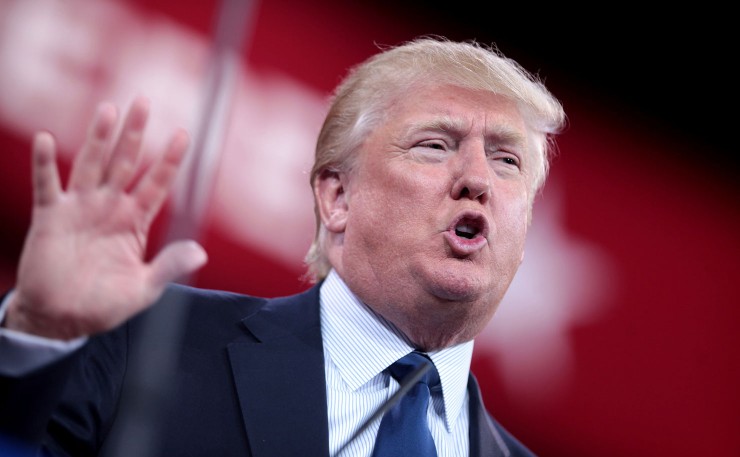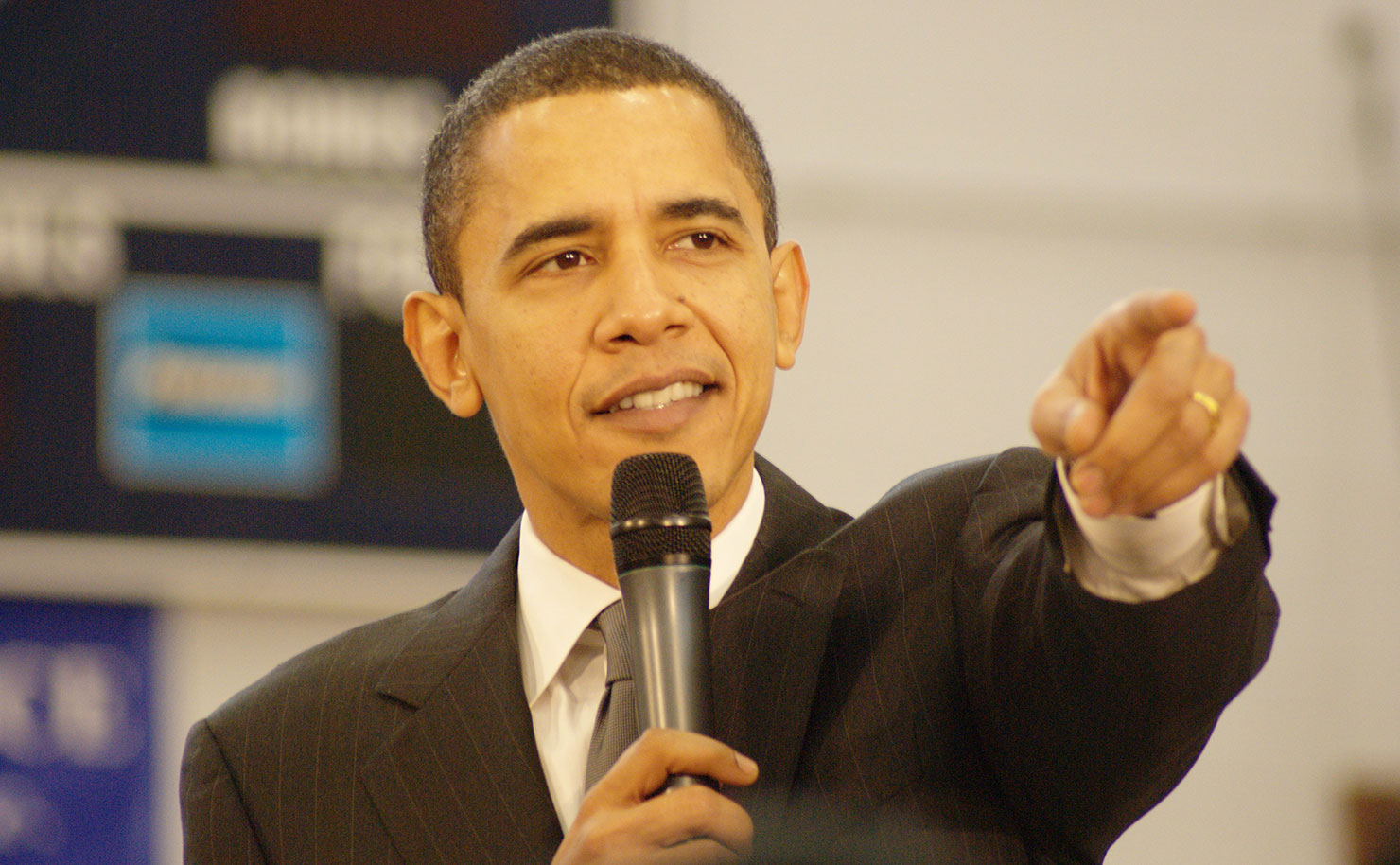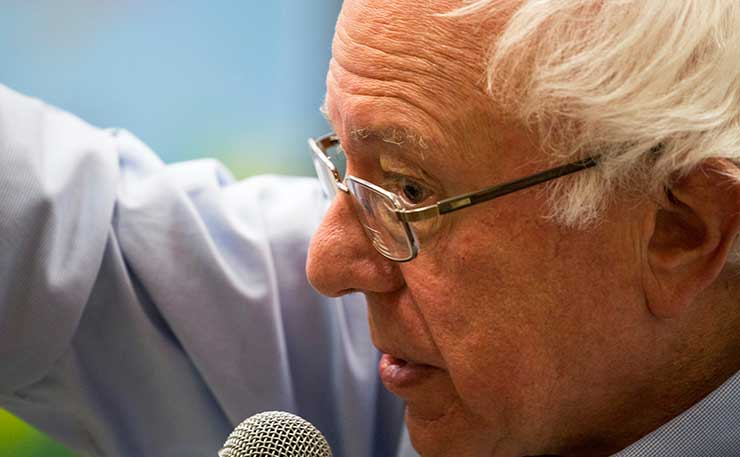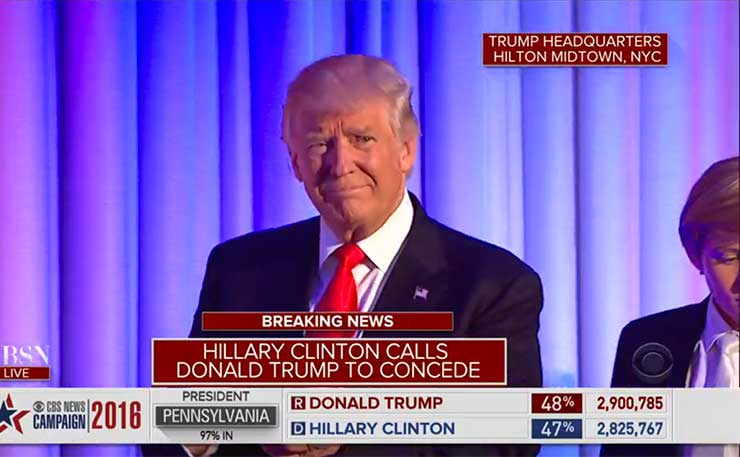After eight years of Obama – a man who promised ‘change and hope’ and delivered neither, Americans voted for the least ‘establishment candidate, writes Michael Brull.
Back in 2008, President George Bush (the second one) was wildly unpopular. He’d taken America to war in Afghanistan and Iraq, and the latter had proven utterly disastrous.
After presiding over deregulation and corporate handouts, Bush brought the Global Financial Crisis to the world. He became the most unpopular President in modern American history, with his approval rating sinking as low as 25 percent, and disapproval at 71 percent. Years later, Bush was still the most unpopular living president.
There were longstanding trends of American disgust with their political system and form of capitalism. President Bush unified those trends.
Barack Obama ran a campaign promising “hope”, and “change”. He didn’t stress that he was black, and that his election would therefore be historic. He mostly avoided even referencing that aspect of the campaign – it was simply left implicit, or for others to discuss.
Obama used soaring rhetoric about how great America was, so that he could appeal to audiences who thought he meant systemic change was on the way, and also to audiences who just wanted a Democratic administration in power. It was effective: many had hoped that things would change under Obama, and excitedly voted for him.

At the time, the legacy of Bush was so toxic that even the Republicans ran against him. John McCain and his vice-presidential pick Sarah Palin presented themselves as mavericks, fighting the political establishment and Washington, challenging Democrats and Republicans alike. They hoped that those who wanted change would vote for them, too.
In 2008, both Democrats and Republicans promised change to a public that was sick and tired of politicians and crony capitalism. The Americans went with the Democrats, and did so resoundingly. Obama won 365 of 538 electoral votes, and 52.7 percent of the popular vote. In 2012, he won a similarly impressive 332 electoral votes against the hapless Mitt Romney, a stuffed suit and expensive haircut for the Republican establishment.
And now we have Trump.
‘The Donald’ also benefited from anti-establishment sentiment. His enormous wealth allowed him to proclaim that he would never be bought, unlike his crooked opponents.
He tweeted “Sheldon Adelson is looking to give big dollars to Rubio because he feels he can mold him into his perfect little puppet. I agree!”
Journalist Matt Taibbi explained that “In the age of Trump, the Cruzes of the world also have to be rebels against the ‘establishment.’” Yet they “really are all stooges on the take, unable to stand up to Trump because they’re not even people, but are, like Jeb and Rubio, just robo-babbling representatives of unseen donors.”
A year later, Trump quietly changed his position to one more supportive of the Israeli government, and successfully courted Adelson. But the substantial period of independence in between those two events served him well. And by the time he faced Clinton, there was no-one who was going to call him on it.
When the race was narrowed down to Trump and Clinton, most of the establishment wound up on Clinton’s side. She had the preferential support of most Fortune 500 CEOs, the backing of big bankers, and raised over a billion dollars, twice as much as Trump. The corporate media overwhelmingly backed Clinton, with many hand-picked journalists working in coordination with her campaign.

Trump portrayed her as the establishment’s candidate, and for much of the public, that was a devastating critique.
Watch his final two minute ad. If you put aside the quiet anti-Semitism, and the reference to illegal immigration, it mostly sounds like a left-wing attack on the super-rich. The political establishment doesn’t care about people like you, they destroyed our jobs and sent them to foreign countries, putting our wealth into the hands of a handful large corporations and political entities. Only we can stop them.
The framework is clear, the rhetoric is stirring, and the message is seductive. Many Americans do feel disfranchised by America’s political and economic elites.
Compare that to Clinton’s final ad. Utterly vapid, Clinton spouts an array of clichés, such as her undying commitment to “children and families”.
In another final Clinton ad, a pop song plays as texts pop up, explaining why a carefully selected diverse array of people explain their decision to vote for Clinton. “For the planet”, “for this baby”, “for our future” and so on.
Whilst they hint at commitments to progressive objections to Trump, they offer no meaningful reason to support her. One of her stronger final ads catalogues some of Trump’s sexist comments, but in the end, her campaign rested on Trump being awful, and a few clichés.
As Clinton herself complained in internal emails, her staff “just keep giving her poll-tested lines that don’t work, like make the middle class mean something”.
Trump won through appealing to working class grievances, not racism
In 2016, many of those states that had voted for Obama now voted for Trump. Florida, Ohio, Michigan, Wisconsin, and Pennsylvania have 93 electoral votes between them. Twice they voted for Obama. Michigan hasn’t been called yet, but is leaning to Trump. The others have the tick for Trump from the New York Times.
In 2008 and 2012, if they had voted Republican, Obama would have lost. Were those states secretly racist when they helped elect him? Did having a black president make them more racist? Were they lured by Trump’s promise of overt racism and sexism? Did they not notice that Obama is black?
Perhaps their votes were based on other issues. Michigan, Wisconsin, Pennsylvania and Ohio are considered part of the “Rust Belt”. That is, these are states which used to have manufacturing jobs. Then America signed free trade agreements, shipped their jobs to countries like Mexico and China, and shut down the factories.
It was Bill Clinton, supported by Hillary, who signed NAFTA in 1994, the free trade agreement that, as Michael Moore explained, “helped to destroy the industrial states of the Upper Midwest”.
Blue collar whites were Trump’s base in these states, whilst white collar whites with tertiary education were more resistant to Trump’s message. Notably, blue collar workers are more economically precarious, and are more vulnerable to the kind of free trade agreements pushed by politicians like the Clintons.

As Moore noted, “When Trump stood in the shadow of a Ford Motor factory during the Michigan primary, he threatened the corporation that if they did indeed go ahead with their planned closure of that factory and move it to Mexico, he would slap a 35 per cent tariff on any Mexican-built cars shipped back to the United States. It was sweet, sweet music to the ears of the working class of Michigan, and when he tossed in his threat to Apple that he would force them to stop making their iPhones in China and build them here in America, well, hearts swooned.”
Media elites have preferred to mock and dismiss Trump voters. How could they be so stupid and poorly educated? Don’t they know how problematic his views are? Didn’t they watch the latest viral clip of a highly paid television comedian “destroying” Trump and showing them how dumb they are?
Clinton supporters were in no position to consider their grievances. So they expressed no interest in their desperation and vulnerability, imposed through policies that the Clintons had pushed for decades.
Trump is assuredly not one of the working class, but he told them he stood with them, he trashed the trade deals that had devastated their states, and he didn’t talk down to them. He knew they were angry, and he seemed to care.
Clinton, on the other hand, hasn’t visited Wisconsin since April. You can get a sense of her sympathy for white workers by her campaign’s calculated decisions to ignore calls to support raising the minimum wage.
Crude racism is bad, institutional racism is complicated
Many media elites eventually reacted with horror and disgust to Trump. He has said many awful things about minority groups, particularly Mexicans and Muslims. Traditionally, Republicans are supposed to dog whistle. They’re not supposed to make crudely racist comments. Yet as Matt Taibbi showed, that was all it took for him to win the Republican primaries, as the public saw that they were getting the real deal, who wouldn’t be cowed by political correctness.
Trump also benefited immensely from the free media coverage he got from each new outrageous comment he made, blandly reported on across US media.
Trump didn’t make coded appeals. He gave voice to the cruder, more extreme racists of America, like David Duke and the KKK. He also offered a kind of validation to those with less extreme concerns and anxieties about Mexicans and Muslims, who felt they lived under a stifling political correctness.

This kind of racism is the kind that respectable, educated types know is never okay and should be condemned. The respectable type, however, has been firmly established as bipartisan wisdom.
Take Trump’s rhetoric about Mexicans, building that wall, and the need to deport illegal immigrants. Such rhetoric was ugly, and hurtful.
Now consider the actual record of the constitutional law professor President, Obama. In February 2014, the Economist reported that:
America is expelling illegal immigrants at nine times the rate of 20 years ago (see article); nearly 2 million so far under Barack Obama, easily outpacing any previous president. Border patrol agents no longer just patrol the border; they scour the country for illegals to eject. The deportation machine costs more than all other areas of federal criminal law-enforcement combined. It tears families apart and impoverishes America.
The Economist pondered why Obama would oversee such an “illiberal, cruel and pointless” policy. The “Machiavellian explanation is that it motivates Latinos, who associate such barbarism with Republicans, to keep voting for the Democrats”. Obama apologists claim that:
“He is merely following laws written by nativist Republicans. This is a cop-out. As president he sets priorities for the executive branch, which cannot catch and prosecute everyone who breaks any of the gazillions of federal rules. He can find ways to slow the deportation of harmless immigrants and concentrate on those who have committed serious crimes. He has already delayed action against those who arrived as children.”
In March 2014, the largest Latino advocacy organisation in the US finally broke with Obama. It was the last major Latino organisation to defend Obama’s record. NCLR President Janet Murguía dubbed Obama the “deporter-in-chief”. She complained that “He can stop tearing families apart. He can stop throwing communities and businesses into chaos. He can stop turning a blind eye to the harm being done. He does have the power to stop this. Failure to act will be a shameful legacy for his presidency.”
In late 2014, under pressure from activists, Obama issued an executive action to reform deportation policy, and protected up to 5 million undocumented people in America from deportation. Then in 2016, he stepped up deportations again, ordering the deportation of thousands of children without any court hearing. Lisa Mascaro reported that weekend raids, targeting parents and children, “threatens to blur what had been a stark contrast between the party’s position and that espoused by leading Republican presidential candidates, most notably Donald Trump, who proposed tough ways to keep migrants out”.
Indeed.
Trump’s comments about Mexicans and undocumented people have been reprehensible. But the actions of the deporter-in-chief have already had a horrendous effect on millions of human beings.
The result was that fewer Latinos were willing to back the Democratic nominee this time. In 2012, Obama won 71 per cent of Latino voters, whilst Romney got 27 per cent. This election, Clinton got 65 per cent of the Latino vote, to Trump’s 29. Trump did better among Hispanic voters than Romney did. Trump also did better among black voters than Romney, and Clinton did worse than Obama.

Was the diminished Latino enthusiasm for the Democrats a product of privilege? Had they internalised more racism in the last four years? Or have they simply become disillusioned? They had voted for a President who promised hope and change, and he turned out utterly vicious.
Whilst media types were comfortable denouncing the racist rhetoric of Trump, Obama’s deportations proved more controversial. As many lives as he destroyed, that was merely a policy dispute.
To win an election, you need enthusiastic supporters. Trump had enthusiastic racists on his side. The Democrats would have found it harder to get enthusiastic anti-racists on their side, because of their lousy record.
Take Trump’s infamous call to build a wall. Jorge Ramos noted that Clinton voted for building a fence on the border with Mexico in 2006.
“What’s the difference between your idea and Donald Trump’s idea on building a wall with Mexico?” Ramos asked. Clinton denied wanting to build a wall.
“Well, I voted for border security and some of it was a fence… I don’t think we ever called it a wall. Maybe in some places it was a wall.”
This kind of distinction between Trump and Clinton may have contributed to Latinos responding to Trump in a comparable way to how they responded to Romney.
The Democrats sabotaged their best election chance
To summarise: Clinton was the candidate of the establishment, at a time when the public was sick of the establishment. Working class white Americans voted for hope and change in 2008 when they elected Obama. They voted for him again in 2012.
In 2016, they gave up, and voted for the Republican who promised to take on the establishment, oppose free trade agreements and put up tariffs to protect workers in the Rust Belt.
Whilst a strong majority of black and Hispanic Americans backed Clinton, they gave her less support than they gave Obama. The hateful rhetoric of Trump was not enough to compensate for the lousy record of Clinton and the Democrats.
Perhaps if the Democrats had nominated a better candidate they would have won. Someone who would have been able to reach the white working class in the rust belt. Someone who would have been able to promote social democracy as the answer to their worries, rather than racism and nationalism.
America had that candidate. Bernie Sanders was not perfect, but he was a stronger candidate against Trump, and consistently performed better in polls against Trump than Clinton did.

Sanders is currently the most popular politician in America by some distance. He shows that a credible campaign against the establishment can come from the avowedly socialist left, and gain considerable support, including among those who voted for Trump.
Of course, Sanders faced disadvantages from the beginning against Clinton. Clinton had a far higher national profile than Sanders, and had the benefits of considerable backing from political, media and financial elites.
The Clinton campaign used its influence to bias the primaries against Sanders. For example, the Democratic National Committee discussed with the campaign how to limit the debates and schedule them in a way to minimise their impact.
Donna Brazile, the chairperson of the DNC, and formerly a regular CNN contributor, also leaked some of the debate questions to the Clinton campaign in advance.
After her behaviour was exposed, she was fired by CNN. She became the head of the DNC after Debbie Wasserman Schultz resigned. Schultz was forced to resign after Wikileaks exposed emails showing the DNC conspiring against the Sanders campaign. \
Among the emails were those showing DNC officials considering using Bernie Sander’s atheism against him, as Southern Baptists “would draw a big difference between a Jew and an atheist”.
What was the influence of the Clinton campaign’s rigging of the primary process? It is hard to know. Though Wikileaks has revealed some of what has occurred, much of it may not have been written down in emails. What we do have is one revealing email from within the campaign.
The author emails the head of Clinton’s campaign, explaining that he had worked “under 3 Democratic speakers as well as working 6 years for Lloyd Bentsen. I know how the game is played and I know how the fix was in, because I helped fix games under some of the best such as Tip and Jim Wright.”
And, he explains, “The Democratic base, labor union workers, liberals may not understand the nuances and sophistication about how these fixes are done, but they are madder than hell because they intuit this, they know they are getting a rotten deal”. And so, “Democratic voters distrust Democratic politicians and stay home”.
Indeed. Democrats don’t know how the fixes are done, but they intuit them, they know they are getting a rotten deal, and they are mad as hell. And if that’s what the Democrats think about their own party, you can guess what right-wing voters think about them.
They, too, are madder than hell. They elected the candidate to give voice to their rage. A dangerous, lunatic candidate, who is now the most powerful person on the planet, with access to an entire nuclear arsenal.
Donate To New Matilda
New Matilda is a small, independent media outlet. We survive through reader contributions, and never losing a lawsuit. If you got something from this article, giving something back helps us to continue speaking truth to power. Every little bit counts.





